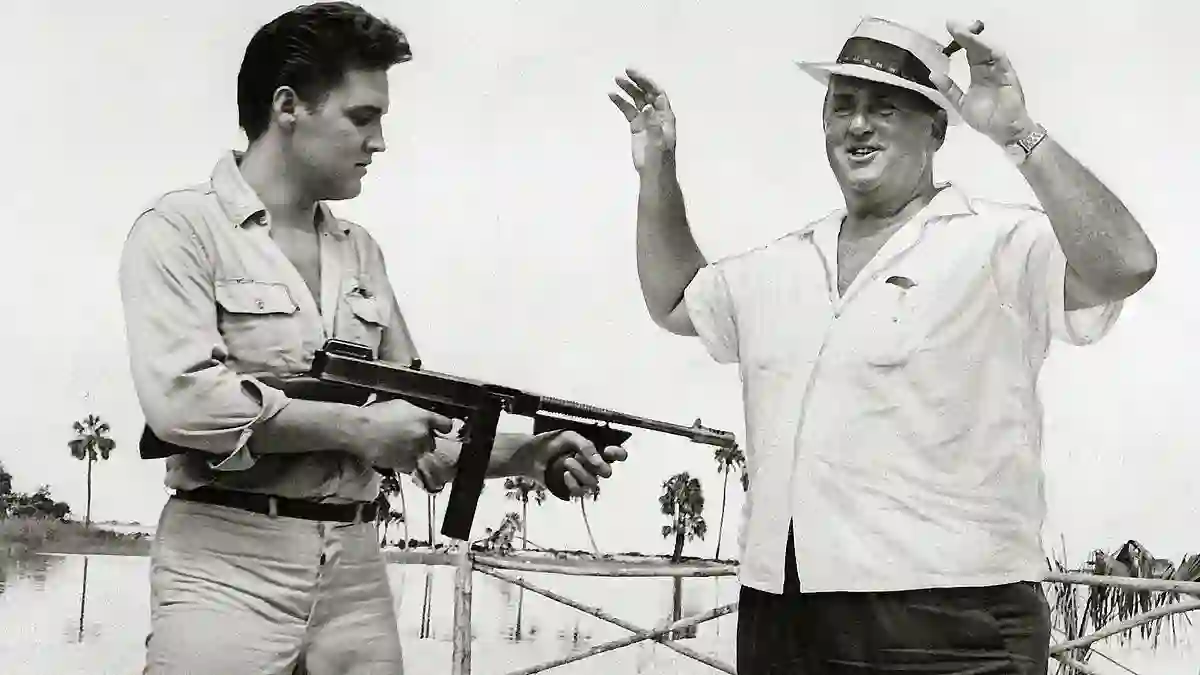When people think of Elvis Presley, they often picture the glamour, the fans, the music—and the tragic downfall.
But behind the spotlight was a deeply complicated and, at times, toxic relationship between Elvis and his longtime manager, Colonel Tom Parker.
While on the surface it looked like a classic star-manager setup, addiction—on both sides—told a far darker story.
Elvis’s Fame Fueled More Than Just Music
By the late 1970s, Elvis was no longer just the King of Rock ’n’ Roll.
He was exhausted, financially drained, and heavily dependent on prescription drugs. Despite his fame and fortune, Elvis couldn’t slow down.
He had to keep performing—not out of passion, but to pay for a bloated entourage and a circle of doctors who enabled his addiction.
But the pressure wasn’t just coming from his own spending.
His manager, the infamous Colonel Tom Parker, had a habit of burning through mountains of cash in Las Vegas casinos.
Elvis’s tours weren’t just funding his lifestyle—they were covering Parker’s roulette losses, too.
Colonel Parker’s Cut Went Deeper Than It Seemed
Over their 21-year partnership, Elvis earned millions.
But what most people don’t know is that Parker took a whopping 50% of his earnings. And it didn’t stop there.
Parker had clever little side hustles going on behind the scenes.
For Elvis to record a song, the songwriter often had to give up a slice of their royalties—so Parker, through Elvis’s music company, got a cut of hundreds of songs, including hits like Heartbreak Hotel.
Dolly Parton once famously refused to give up rights to I Will Always Love You, so Elvis never recorded it.
The Man Behind the “Colonel” Wasn’t Who You Thought
Despite the military title, Parker wasn’t a real colonel. In fact, he wasn’t even American.
Born Andreas Cornelis van Kuijk in the Netherlands in 1909, he smuggled himself into the U.S. and later changed his identity to Tom Parker.
He served briefly in the U.S. Army but never became a citizen, leaving him stateless.
Because he didn’t have a passport, he couldn’t leave the country.
That’s why he never visited Elvis during his military service in Germany or arranged any UK tours—he couldn’t legally travel abroad.
From Carnival Barker to Elvis’s Shadow
Before music, Parker spent decades in small-town carnivals across the Southern U.S., eventually transitioning into music management.
He handled stars like Eddy Arnold and Hank Snow before discovering Elvis in 1955.
Winning over Elvis’s parents was the first step. Within a year, Elvis was a household name.
Parker had found his golden goose, and he protected that fortune—his and Elvis’s—with everything he had.
A Manager or a Master Promoter?
Author Peter Guralnick dives into Parker’s complex role in Elvis’s life in his new book The Colonel and The King.
While some, like Guralnick, view Parker as a dedicated manager who helped shape Elvis’s rise, others see him differently.
Sure, Parker was a master promoter—especially early on—but he didn’t always act in Elvis’s best creative interest.
He prioritized big-money deals over meaningful career moves. He never read Elvis’s film scripts or pushed for higher-quality projects.
The result? Elvis starred in more than 30 films—many of them critically panned.
The songs, the dialogue, the plots—almost all forgettable.
Elvis Knew the Movies Were Bad—But Felt Trapped
In a candid conversation in Las Vegas, Elvis once admitted how embarrassed he was by some of his film work.
He said, “I’d like to say they were good, but I can’t… I had to do them. I signed contracts.”
And sitting quietly during that interview? The Colonel—listening but saying nothing.
A Tragic Ending for the King and His Manager
Elvis’s life came to a tragic end in 1977. He died at 42 after a heart attack brought on by years of drug abuse.
Parker, devastated and sidelined by a court ruling that stripped him of all Elvis-related control, never bounced back.
Though he lived another two decades, he spent his final years in a modest Las Vegas home.
He still visited the casinos—but now, $25 bets were all he could afford.
The Book That Tells It All
Peter Guralnick’s The Colonel and The King is a deep dive into this extraordinary, and often troubling, relationship.
It’s a hefty read at 624 pages, but for fans of Elvis—or anyone curious about the price of fame—it’s a revealing look at how addiction, ambition, and blind loyalty shaped one of the most iconic careers in music history.
